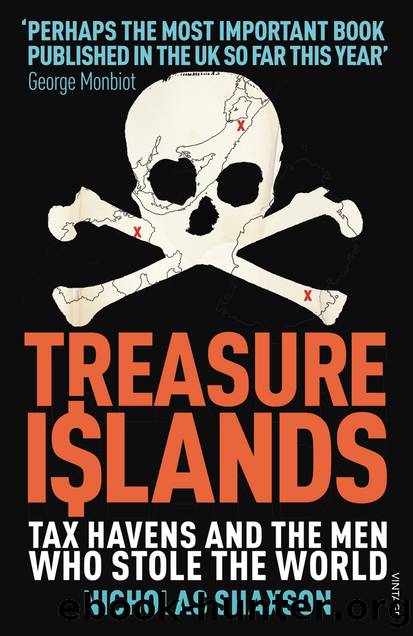Treasure Islands: Tax Havens and the Men who Stole the World by Nicholas Shaxson

Author:Nicholas Shaxson [Shaxson, Nicholas]
Language: eng
Format: mobi
Publisher: Bodley Head
Published: 2011-02-17T13:00:00+00:00
10
Resistance
In combat with the ideological warriors of offshore
IN APRIL 1998 the Organisation for Economic Cooperation and Development, a club of rich countries that includes the world’s most important secrecy jurisdictions, made an astonishing admission: that tax havens cause great harm. Tax havens and associated offshore activities, an OECD report acknowledged, ‘erode the tax bases of other countries, distort trade and investment patterns and undermine the fairness, neutrality and broad social acceptance of tax systems generally. Such harmful tax competition diminishes global welfare and undermines taxpayer confidence in the integrity of tax systems.’1 Offshore is not only a place, a system and a process, it is also a collection of intellectual arguments. The OECD’s new project was the first serious and sustained intellectual assault on the secrecy jurisdictions in world history.2 At the time, there were widespread protests against the obvious evils of globalisation, yet campaigners focused many of their arguments on trade and all but ignored the offshore system. The OECD’s initiative, which contained a lot of baffling discussion of international tax, hardly registered on protesters’ agendas.
The report was allowed to emerge for several reasons. First, the evidence had become impossible to ignore: the use of tax havens was ‘large, and expanding at an exponential rate’. Second, the report targeted mostly small Caribbean islands that were not OECD members and glossed over the role of OECD countries.3 Also, several OECD countries who were not tax havens pushed the report hard. But there was another important reason why the report got through: tax havens are so steeped in indifference to big intergovernmental bodies that although the OECD had flagged the report for two years, almost nobody offshore had paid it enough attention to mount a serious effort to stop it emerging.
John Christensen was in Jersey when the report came out. ‘Virtually nobody there took it seriously except me,’ he said. ‘Bankers were saying, “OECD who? Isn’t that some sort of customs organisation?”’ Daniel J. Mitchell of the right-wing Heritage Foundation in Washington, one of the secrecy jurisdictions’ most vocal supporters, had a similar reaction to the Paris-based OECD. ‘I thought, “Ah, just a bunch of crazy European socialists.”’4 Still, Mitchell decided to write a couple of things on the report for the Heritage Foundation, and began to see that it mattered. And the OECD’s follow-up report in 2000 contained a primed bomb: a blacklist of thirty-five secrecy jurisdictions, and the threat of ‘defensive measures’ against havens that did not shape up. More alarming for Mitchell, it was not only ‘European collectivists’ who backed the OECD, but the Clinton administration too.
‘Our side was caught with our pants down,’ Mitchell said in an interview in Washington. ‘Heritage, a big full-service think tank, doesn’t focus on just one thing. I thought we ought to have a group to have a go at this.’ So he got together with Andrew Quinlan, a friend from college, and Veronique de Rugy, a Paris-educated libertarian academic, to create a small outfit called the Center for Freedom and Prosperity
Download
This site does not store any files on its server. We only index and link to content provided by other sites. Please contact the content providers to delete copyright contents if any and email us, we'll remove relevant links or contents immediately.
The Fifteen Biggest Lies about the Economy: And Everything Else the Right Doesn't Want You to Know about Taxes, Jobs, and Corporate America by Joshua Holland(850)
The World For Sale by Javier Blas(662)
The Economist (20210109) by calibre(612)
Made in China by Anna Qu(574)
Philippines--Culture Smart! by Culture Smart!(532)
Boom and bust a global history of financial bubbles by Quinn William Turner John(511)
Big Money by Kenneth P. Vogel(509)
The Dictatorship of Woke Capital by Stephen R. Soukup(508)
Forex Trading All In One For Dummies by Mishra Mamta(506)
The Money Revolution by Anne Boden(501)
Mission Economy by Mariana Mazzucato(497)
Tax the Rich! by Morris Pearl(486)
Cross Winds: Adventure and Entrepreneurship in the Russian Far East by Myers Steven(477)
The New Retirement Savings Time Bomb by Ed Slott(475)
The Inflation Myth and the Wonderful World of Deflation by Mark Mobius(466)
The Great Demographic Reversal by Charles Goodhart & Manoj Pradhan(443)
Fundamentals of Finance by Mustafa Akan Arman Teksin Tevfik(442)
How Finance Is Shaping the Economies of China, Japan, and Korea by Hugh Patrick(429)
Business Recoded by Peter Fisk(428)
